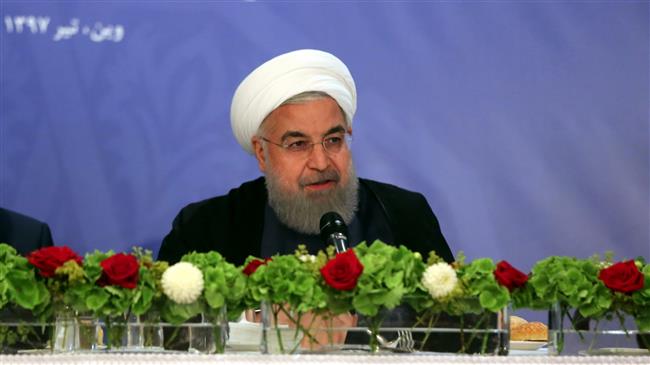President Hassan Rouhani has tried to hold back the wave of US sanctions threatening Iran’s economy, insisting that Washington cannot stop Iranian oil exports.
Rouhani said in Switzerland on Tuesday:
I believe that what US officials said about blocking Iran’s oil export is pointless and they will never be able to make it happen. This action by the White House is illegal, extraterritorial and in violation of all international commitments in the field of energy and trade. The idea that everybody can export oil, except for Iran, is incorrect and unwise.
But the Iranian President, appearing alongside Swiss counterpart Alain Berset, offered no explanation of how Iran will maintain its sales, which had reached 2.5 million barrels per day after the implementation of the July 2015 nuclear agreement.
Instead, in a statement later in the day in Vienna Austria, Rouhani proclaimed that sanctions will “carry a heavy cost” for the US: “The Americans claim that they want to break off the bridges connecting Iran with the world, but they will never reach that goal. They are not the world’s absolute power.”
Donald Trump’s May 9 announcement of US withdrawal from the deal, with expanding sanctions, has already dented Iranian exports. In the first half of June, Tehran’s shipments fell 16% to just over 2.1 million bpd.
The US step has been bolstered by OPEC’s decision — in conjunction with Russia and over Iran’s objections — to raise production by 1 million bpd to cover the drop in Iranian exports.
In response to the US threat to punish any foreign company dealing with Iran as of November 4, refiners — including two of the largest in India — have announced the suspension of business with Tehran. Shippers and insurers are halting transport of Iranian crude.
With India and South Korea both drawing down exports, Iran is left with the vague hope that China will provide salvation by increasing its intake. However, there has been no sign yet that Beijing, which has proceeded carefully over the US sanctions, will respond.
The Rouhani Government had hoped that the European Union and its members would expand trade and investment with Tehran. But the EU faces difficulties in shielding its major firms from US punishment, and the Supreme Leader and Iranian hardliners have been sceptical about the talks.
Significantly, Rouhani’s tour this week is to non-EU state Switzerland and Austria, far less important within the EU than the UK, France, and Germany, all participants in the nuclear agreement.
Without a clear path through established routes to sustain oil exports, the Government is now putting out the novel idea that it can use Iran’s private market for exports, defying both Washington and OPEC.
Still, Rouhani told Iranian expatriates in Vienna that “nobody except for a small country supports” the US while “two important European governments welcome the Iranian President”.
There was a small consolation for the Government from Washington. The Trump Administration stepped back from last week’s demand that all countries reduce purchases of Iranian oil to “zero” by November 4.
“We are prepared to work with countries that are reducing their imports on a case-by-case basis,” said Brian Hook, the State Department director of policy and planning.
The announcment appeared to be a reassurance of markets and a signal to India, South Korea, and Turkey that they do not have to arrange a complete switch of suppliers by the deadline.

